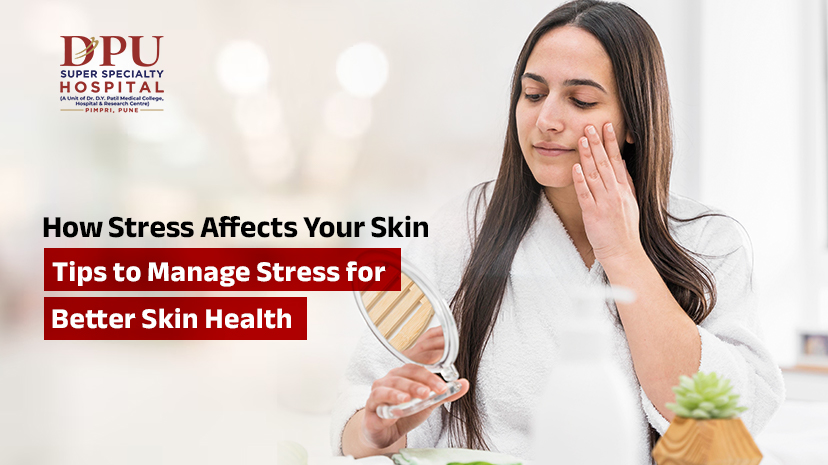How Stress Affects Your Skin: Tips to Manage Stress for Better Skin Health

Stress is an inevitable part of our journey, but do you know that it can have a serious impact on your skin? From breakouts to irritations of eczema, the effects of stress are not only internal but also on surface of your skin. In this blog, we will be talking about how stress affects your skin, tips on how to manage it, and treatments such as microneedling and chemical peels that rejuvenate and restore the health of your skin.
1. How Stress Causes Skin Conditions Like Acne, Eczema, Skin inflammation, and Hives
When you’re stressed, your body releases cortisol, the “stress hormone,” which can have a direct effect on your skin. Excess cortisol levels can increase oil generation in your skin, leading to blocked pores and acne breakouts. Besides, stress can worsen existing skin conditions like eczema and psoriasis by triggering inflammation, causing flare-ups or intensifying symptoms.
Hives, or urticaria, is another common skin condition that is caused by stress. Stress-induced hives often appear as itchy, red, raised welts that can be irritating and painful. In a nutshell, stress disrupts the barrier function of the skin, making it more sensitive to inflammation and skin conditions.
2. When to See a Dermatologist: How Stress May Be Damaging Your Skin
Some skin issues must be worked on through home remedies, but you must note when you have crossed the line and need professional aid. Notice how chronic breakouts, extreme dryness, or intense redness and sudden surges of eczema or psoriasis have attacked your skin, and it would be time to consult with your dermatologist. A dermatologist will evaluate if stress is aggravating your skin and would recommend tailored treatments in order to create balance once again. In addition, if stress-induced skin problems begin to interfere with your daily life, self-confidence, or well-being, visiting a dermatologist can help you deal with both the physical and emotional aspects of skin care.
3. The Science Behind Microneedling: Boosting Collagen Production to Rejuvenate the Skin
Microneedling is an advanced procedure that can do wonders for your skin, especially when stress has led to visible signs of aging or acne scars. It works by using a derma roller or a device with fine needles that make tiny, controlled micro-injuries, thus stimulating the body's natural healing process by encouraging the production of collagen and elastin.
As collagen levels increase, skin appears firmer, smoother, and more rejuvenated. Microneedling can also help improve the appearance of scars, stretch marks, and large pores common concerns exacerbated by stress. By boosting collagen production, microneedling restores the skin’s vitality, giving it a refreshed and youthful appearance.
4. Chemical Peels: The Secret to Smoother, Clearer Skin
Chemical peels can be a game-changer if stress is leaving your skin dull, uneven, or prone to breakouts. It is a non-invasive procedure that involves the application of a chemical solution on the skin. This solution exfoliates the surface layers, removing dead skin cells and encouraging new skin cell growth. The end result is smoother, clearer, and more radiant skin.
Acne scars, hyperpigmentation, and sun damage are conditions that respond especially well to chemical peels. Chemical peels can work miracles for individuals who have suffered chronic skin problems, such as acne or inflammation, as a result of stress.
Educating Yourself on Symptoms: When to Seek a Dermatologist
Stress can have a profound effect on your skin, resulting in several conditions that may necessitate professional care. Here's how to know when it's time to see a dermatologist.:
- Chronic Breakouts
Stress causes the body to produce more oil, resulting in persistent acne. A dermatologist can recommend targeted treatments if acne is severe or unresponsive. - Inflammation
Stress can lead to redness and irritation, which can worsen conditions such as eczema and psoriasis. A dermatologist can manage chronic inflammation with proper treatments. - Flare-ups of Pre-existing Skin Conditions
Stress can exacerbate pre-existing conditions like eczema or rosacea. If flare-ups become more frequent or intense, a dermatologist can adjust your treatment plan. - Dryness and Sensitivity
Stress can damage the skin’s moisture barrier, leading to dryness and increased sensitivity. A dermatologist can suggest treatments to restore moisture and skin comfort.
If these symptoms are persistent or worsening, it’s time to consult a dermatologist. A professional will evaluate your skin, understand your stress triggers, and tailor treatments to restore both your skin’s health and appearance.
Tips to Manage Stress for Better Skin Health
Managing stress is vital for maintaining both your mental and skin health. Here are a few tips to help you reduce stress levels and improve your skin:
- Exercise Regularly: Physical activity boosts endorphins, reduces cortisol, and improves circulation, all of which benefit your skin.
- Prioritize Sleep: Adequate sleep helps regulate hormone levels and supports skin rejuvenation.
- Practice Mindfulness or Meditation: These techniques help reduce stress, enhance emotional well-being, and promote healthier skin.
- Hydrate: Drinking plenty of water keeps your skin hydrated and helps flush out toxins.
- Eat a Balanced Diet: Nutrient-rich foods with antioxidants can support skin health and combat inflammation caused by stress.
Conclusion
Stress not only causes mental illness but also causes adverse effects on the skin. Learning how stress contributes to the skin disease and how one can proactively work on managing their stress levels may help them maintain healthy skin with a great look. If your skin condition doesn't improve despite trying several products, then see a dermatologist who will advise you based on your specific skin condition and offer personalized treatments.
At our clinic, we help you achieve healthier, glowing skin through advanced treatments like microneedling or chemical peels, or expert dermatological care. Your skin deserves the best, and we are here to guide you every step of the way.








